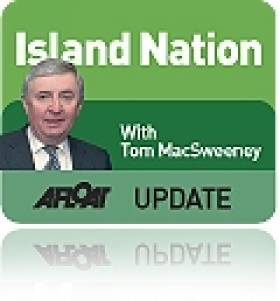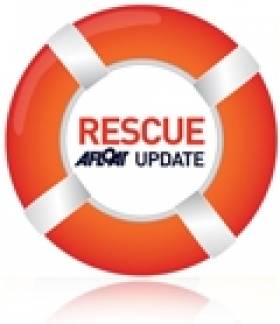Displaying items by tag: Merchant Navy
Trinity House Joins Ferry Operator Red Funnel in New Cadetship Venture
Trinity House, the General Lighthouse Authority for England, Wales and Channel Islands has joined with Isle of Wight ferry operator Red Funnel to create a new joint venture as part of the Merchant Navy Scholarship Scheme.
As part of its charitable mandate to sponsor cadets to become qualified officers in the Merchant Navy, Trinity House’s Merchant Navy Scholarship Scheme is key to ensuring that the next generation of Britain’s seafarers is world-class.
This new venture builds on a scheme that is already well known in the cadetship sector for its variety and quality.
The three year cadetship will allow successful candidates following Deck and Marine Engineer training pathways to qualify as Officers of the Watch, with the added possibility of employment with Red Funnel as their careers progress.
Captain Nigel Hope, Trinity House’s Director of Maritime Training, said of the new venture: “The joint venture partnership with Red Funnel to train Merchant Navy Cadets within the Trinity House Merchant Navy Scholarship Scheme will create additional opportunities for those seeking a maritime career and the opportunity to work with a well respected and professional ferry operator.
“Red Funnel’s commitment to train the next generation of seafarer demonstrates their support for the maritime sector and meets the ever-demanding requirements of the shipping industry.”
Leanna Lakes, Operations Director at Red Funnel, said: “At Red Funnel, we are committed to creating clear career pathways for seafarers and working with organisations that help to inspire and encourage the next generation of innovators to join the industry.
“It’s an exciting time to get involved in the maritime sector, and we’re so pleased to be partnering with Trinity House and Just Be Maritime to provide training sponsorship opportunities for Officer Cadets to achieve their professional certification.”
To find out more about Trinity House’s Merchant Navy Scholarship Scheme—including entry requirements, study options and applications click HERE.
Why Sea Links Are More Important Than Air Links
#sealinks – In the current debate which has surfaced about the future of Aer Lingus, it is good to hear the realisation in all quarters, from politicians to business, economic and media commentators that Ireland is an 'island nation'. While the importance of air links is being highlighted, those same people could extend their thinking to the maritime links which keep this country alive in a way in which no air linkage can do.
This is emphasised in the leading story in the current edition of my radio programme, THIS ISLAND NATION which you can hear on this website, where I interview the first lady to become President of the Irish Institute of Master Mariners, the professional body for Shipmasters. Sea-going has been a male-dominated profession but Capt. Sinead Reen who lives in Crosshaven, Co.Cork, has done a lot to break that mould. She was also the first woman to qualify as a Deck Officer in Ireland and has served at sea on several types of vessels, including super tankers and cruise ships.
She describes in the interview how she chose a career at sea and, at a time when the Naval Service would not admit women, joined the Merchant Navy: "We are not seen by the general public because we are at sea, carrying the goods, the supplies, the imports, the exports, which this nation needs across the world's seaways. Without ships and seafarers this nation would find it difficult to exist." She discusses life at sea for a woman in a male environment aboardship and speaks of the great opportunities for employment at sea for both women and men. Her election underlines the opportunities of a career at sea for women in what has been a male-dominated profession.
It is an interview worth listening to, as is that about the commemorations planned in the Cork Harbour town of Cobh for the centenary of the sinking of the Lusitania in May.
Hendrik Verway, Chairman of Cobh Tourism, outlines the details of the commemorative plans. Cobh, where survivors of the Lusitania sinking by a German U-boat on May 7, 1915, were landed as well as the bodies of those who were killed in the tragedy, is planning ceremonies on the seafront at Cobh and a sail past by boats on the evening of May 7, with the vessels displaying a single white light to remember those who were killed. Two cruise ships will be in Cobh on the day. One of them, the Cunard's Queen Victoria, will be on a commemorative voyage and on Thursday afternoon, May 7, will sound her ship's whistle at the time at which the torpedo hit the Lusitania, to start a ceremony on the Cobh seafront . A quayside ceremony will start as the whistle sounds and which will conclude at 2.30 p.m., marking the time when the Lusitania sank beneath the waves. 1,198 passengers and crew died. Survivors were landed at Cobh, to where bodies of the dead were also brought and 169 buried. There were 764 survivors. Only 289 bodies were recovered. 169 are buried in the Old Cemetery in Cobh, 149 in three mass graves and 20 in individual plots. Amongst the commemorative events will be a series of lectures and an exhibition of photographs taken in Cobh, then called Queenstown, in the aftermath of the landing there of survivors and bodies by rescue vessels. Many of these photos have not been on public display before and have been digitised for exhibition from original glass plates photographed at the time, through the co-operation of the National Museum. It is also planned to re-enact the funeral of victims to the Old Cemetery in Cobh.
And in another interview on the programme, Paul Bourke of Inland Fisheries Ireland tells me that, for anglers, it has been a good year for the catching of specimen fish.
Fair Sailing...
Merchant Navy Association Boat Club Launches 'Eyes that can save Lives' Watchkeepers Scheme
#rescue – The Merchant Navy Association Boat Club launches its new "SeaVue" Watchkeepers Afloat Scheme "Eyes that can save Lives"
The SeaVue Watchkeeper Afloat Scheme is modelled on similar lines to the National Coastwatch Institution's "Eyes along the Coast" watchkeeping service operating from the NCI's fifty shore-based look-outs around the coast of England and Wales.
The "SeaVue" Scheme has its origins in the old Auxiliary Coastguard Afloat Scheme that operated in the days before HM Coastguard VHF marine radio communications were as sophisticated, extensive and reliable as they are today, and of course the scheme derives a huge benefit from the vast reservoir of skills, knowledge and experience at sea accumulated by our MNA members, all of whom have a professional maritime background either in the Merchant Navy, Royal Navy, RNLI, HM Coastguard, NCI, or the fishing fleet.
Essentially SeaVue is a scheme whereby members of the Merchant Navy Association Boat Club watchkeepers undertake to act as "watchkeepers afloat" whenever they go out in their boats and "Spot, Plot and Report" incidents, potential casualty situations or persons at risk to HM Coastguard or the relevant inland waterways authority.
Among those members who've registered to participate in the Seavue Service are several who operate on inland waterways and even a few who keep their boats abroad and will therefore report to the relevant SAR authorities in that locality.
More about the SeaVue Scheme, and photos of some of our members boats, can be found on the Members Area of the Merchant Navy Association Boat Club's dedicated new website www.seafarersafloat.com by clicking on the SeaVue button.































































